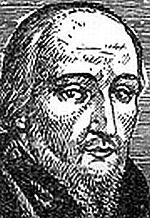

Early life and education. Ambrose was born at Barlow Hall, Chorlton-cum-Hardy, nearManchester in 1585. He was the fourth son of the nobleman Sir Alexander Barlow and his wife Mary, daughter of Sir Uryan Brereton of Handforth Hall. The Barlow family had been reluctant converts to the Church of England following the suppression of the Roman Catholic Church in England and Wales. Ambrose's grandfather died in 1584 whilst imprisoned for his beliefs and Sir Alexander Barlow had two thirds of his estate confiscated as a result of his refusing to conform with the rules of the new established religion. On 30 November 1585, Ambrose was baptised at Didsbury Chapel and his baptism entry reads "Edwarde legal sonne of Alex' Barlowe gent' 30". Ambrose went on to adhere to theAnglican faith until 1607, when he converted to Roman Catholicism.
In 1597, Ambrose was taken into the stewardship of Sir Uryan Legh, a relative who would care for him whilst he served out his apprenticeship as a Page. However, upon completing this service, Barlow realised that his true vocation was for the priesthood, so he travelled to Douai in France to study at the English College there before attending the Royal College of Saint Alban in Valladolid, Spain. In 1615, he returned to Douai where he became a member of the Order of Saint Benedict, joining the community of St Gregory the Great (now Downside Abbey), and was ordained as a priest in 1617.
Mission. After his ordination into the priesthood, Ambrose returned to Barlow Hall, before taking up residence at the home of Sir Thomas Tyldesley, Morleys Hall, Astley. Sir Thomas' grandmother had arranged for a pension to be made available to the priest which would enable him to carry out his priestly duties amongst the poor Catholics within his parish. From there he secretly catered for the needs of Catholic 'parishioners', offering daily Mass and reciting his Office and Rosary for the next twenty-four years. To avoid detection by the Protestant authorities, he devised a four-week routine in which he travelled throughout the parish for four weeks and then remained within the Hall for five weeks. He would often visit his cousins, the Downes, at their residence of Wardley Hall and conduct Mass for the gathered congregation.
Arrest and execution. Ambrose was arrested four times during his travels and released without charge. King Charles I signed a proclamation on 7 March 1641, which decreed that all priests should leave the country within one calendar month or face being arrested and treated as traitors, resulting in imprisonment or death. Ambrose's parishioners implored him to flee or at least go into hiding but he refused. Their fears were compounded by a recent stroke which had resulted in the 56-year-old priest being partially paralysed. "Let them fear that have anything to lose which they are unwilling to part with", he told them.